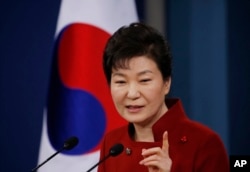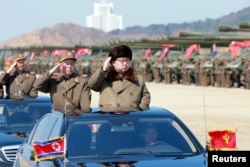When the leaders from the United States, Japan and South Korea meet in Washington on Thursday to address the growing nuclear threat in North Korea, much of the discussion will be about China.
U.S. President Barack Obama, Japanese Prime Minister Shinzo Abe and South Korean President Park Geun-hye will hold a trilateral gathering on the sidelines of this week’s Nuclear Security Summit in Washington.
The trilateral will be the first time these leaders have met since the United Nations imposed harsh new sanctions on North Korea for conducting its fourth nuclear test in January.
Washington and its Asian allies are strongly committed to taking a tough sanctions-based approach to pressure North Korea to give up its nuclear weapons, but questions remain about Beijing’s level of commitment.
“There's a unique relationship between China and North Korea economically. The Security Council resolution really puts that front and center on the table and we hope that that collaboration with China on North Korea will continue," said U.S. Deputy Secretary of State Anthony Blinken on Tuesday.
Pressuring China
The United States worked closely with China in developing the new U.N. sanctions, which require mandatory inspections of all North Korean cargo and bans the export of most of the country’s mineral trade that has been used to fund its nuclear development program.
Beijing’s enforcement of these international sanctions is considered crucial because 90 percent of North Korean trade flows either to or through China.
China’s leaders have pledged to support the sanctions but have also worked to limit their impact.
Citing concerns that some U.N restrictions could cause undo harm to the general populous and increase instability, Beijing has said it will only enforce sanctions specifically targeting Pyongyang’s ability to make weapons.
China’s Foreign Minister Wang Yi recently said, “Blind faith in sanctions and pressure, actually, are not a responsible approach for the future of the Korean peninsula."
Recently Beijing negotiated an exception to the sanctions to reinstate four ships that were blacklisted for past ties to Pyongyang's arms trade.
The Philippines, which seized one of these vessels on March 4, the 4,355-ton Jin Teng, subsequently released it.
Also while the U.S. and its allies have called on the Kim Jong Un government to halt its nuclear program before any formal talks could proceed, China has proposed a "dual-track" approach where peace treaty talks with the North would proceed simultaneously with denuclearization negotiations.
Washington, Tokyo and Seoul have also imposed additional unilateral restrictions on Pyongyang that Beijing does not support.
The U.S. sanctions that authorize the seizure of assets from organizations and individuals doing businesses with North Korea in banned industries like mining and banking, could be used to target Chinese entities.
However the message likely to come out of the trilateral and the subsequent bilateral between Obama and Chinese President Xi Jinping at this early stage in the process is one of unity.
“Stay the course on economic sanctions. [It’s] too early to deviate from that course of action because of China’s proposal of discussing the peace treaty. It’s too early. The focus should remain on putting pressure on North Korea,” said Bong Young-shik, a national security analyst with the Asan Institute for Policy Studies in Seoul.
THAAD
Washington and its allies will also likely address how to manage China’s anxiety over North Korea’s nuclear program with its concern for the expanding U.S. military presence in Asia.
Beijing has protested the possible deployment of the U.S. Terminal High Altitude Area Defense (THAAD) missile defense system in South Korea.
Prior to North Korea’s February 7 launch of a long-range rocket, Seoul was sensitive to Beijing’s concerns and reluctant to deploy THAAD.
But Pyongyang’s persistent provocations, that include firing repeated short-range missiles and projectiles have motivated Seoul to prioritize national security over diplomatic relations with a key economic trading partner.
Park and Xi
President Park will also meet with President Xi for the first time since the North Korean nuclear test.
Park had developed a close friendship with Xi and visited China numerous times. Last year she was the only U.S. ally to attend celebrations in Beijing for the 70th anniversary of the end of World War II.
In contrast Kim Jong Un was conspicuously absent from the event and has yet to meet with the Chinese President.
But Seoul’s close military alliance with Washington and support for THAAD has strained the growing ties between South Korea and China.
“Although China understands South Korea's position, China thinks that South Korea considers only its own position,” said Professor Woo Su-keun, a North Korea analyst at Donghua University in Shanghai.
While China has not grown any closer to its defiant ally in Pyongyang, Woo says, Beijing also now views Seoul in a less favorable way and more as a client state of the U.S.
Youmi Kim in Seoul contributed to this report.







